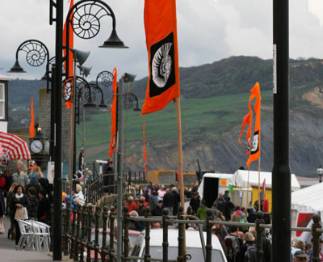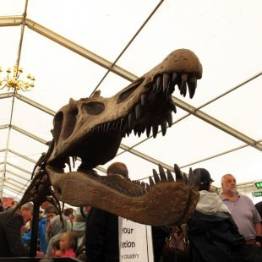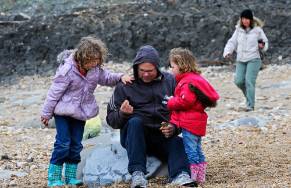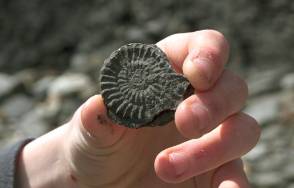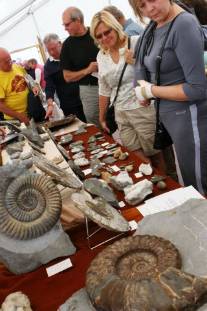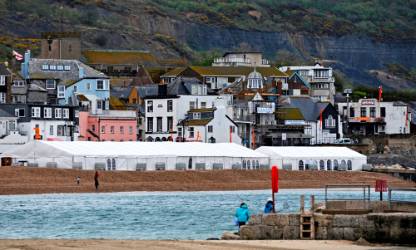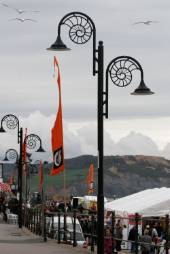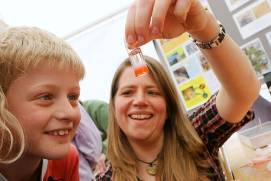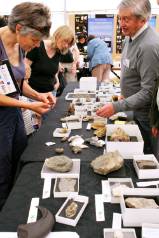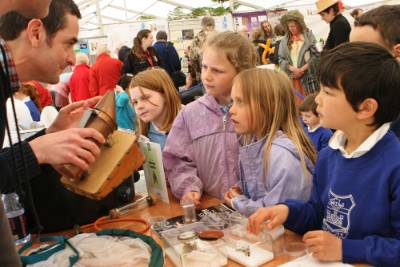What intriguing finds will the team of Natural History Museum scientists be asked to identify at this year's Lyme Regis Fossil Festival over May bank holiday weekend, 4 - 6 May? I asked the team of palaeontologists who are today getting ready to go (we have a regular presence at this popular annual event).
Lyme Regis Fossil Festival 2012 highlights: the parade and lots of Natural History Museum displays and activities.
'It's mainly the Dorset ammonites that I am expecting to see,' our vertebrates curator Lorna Steel told me. 'But people do bring in all sorts of things from all sorts of places. The last time I went, someone handed me a badger skull... and someone else had a load of ichthyosaur bones that their granddad had found in a pile of rubble while working as a builder - they'd kept them in their loft for decades!'
Over the next few days our scientists will be setting up their stalls in the festival's Grand Marquee fossil fair (below left) ready to meet the public and talk to them about fossil collecting.
As well as hoping to discover Lower Jurassic ammonites or ichthyosaur fossil specimens, the Museum palaeontologists will be inviting festival-goers to assemble and take apart a Baryonyx skull replica and sift sand from Kent for shark teeth. There are other Museum offerings too, including gold panning, a dino dig activity led by some of our Learning Department, and talks about meteorites, whale carcass communities and corals.
A presentation of The What on Earth? Wallbook of Natural History timeline will be a fun attraction this year, with specimen highlights from our scientists. This Museum book is a unique guide to the history of life on Earth.
The Fossil Festival is just as much about music and arts as it is about fossil collecting and rockpool rambling on the beaches, where Mary Anning once walked. Have a look at the official fossil festival website programme to choose from activities as diverse as the Travelling Pliosaur Cinema, stonebalancing and carving, and a fossil time machine.
The theme for the 2012 Lyme Regis Fossil Festival is Discovering Earth. The event organisers are emphasising how vital fossil collecting is today, particularly for climate change research:
'Paleoclimatologists studying both fossil finds and the coast itself learn new things about not only the ancient seas and the creatures that swam there, but also the way our oceans and marine life might respond in future as our climate changes. This evidence of how past life forms reacted to changing temperatures and conditions in the past helps to tell us what we might need to be prepared for.'
There are still important fossils and rocks being discovered on this historic Jurassic coastline - most recently a large pliosaur skull and a new species of crocodile.
If you can't make it to Dorset over the bank holiday weekend and are visiting the Museum, drop in to our talks with live-video-links to the Museum team at the festival. Fossil hunters: Live from Lyme Regis is on Saturday (12.30 and 14.30) and Seashore Search: live from Lyme Regis beach is on Sunday (12.30 and 14.30). Some of our scientists at the festival will also be posting live in our new Palaeontology news blog.
The Museum has several huge ichthyosaurs on show in its Fossil Marine Reptiles gallery. One is the largest and most complete of its kind and was discovered by the 19th-century fossil-hunter Mary Anning in Lyme Regis.
Undoubtedly, we have amazing fossils in our galleries from the tiniest to the gigantic. I'd recommend Fossil Marine Reptiles, Fossils from Britain and the Red Zone's Earth Lab where you can use resources to help identify your own British rocks and fossils.
Lyme Regis Fossil Festival website
More fossil information
Find out more about fantastic fossils and ammonites on our Kids only website
Get some tips on fossil hunting
Discover all about fossils online
Watch the Baryonyx video and follow the story of this unusual British dinosaur
Explore dinosaurs and other extinct aquatic animals like ichtyhosaurs



